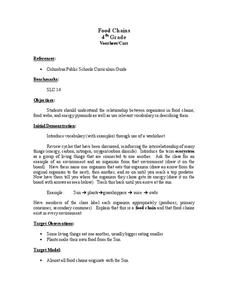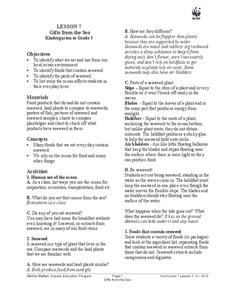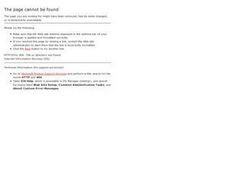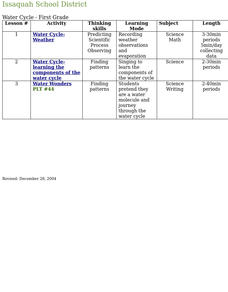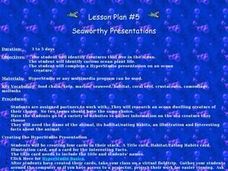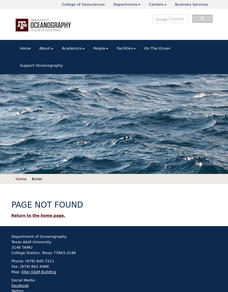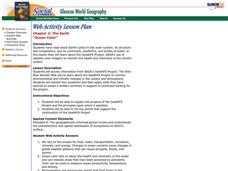Curated OER
Food Chain Checkers
Students model the food chain. In this lesson plan, students play a game resembling checkers that simulates the food chain within the ocean. Students make changes to the game to better represent how the food chain operates.
Curated OER
Food Chains
Fourth graders investigate food chains. They review cycles and discuss ecosystems. They select an environment and create a food chain in small groups. They write their food chain and label it for the class to evaluate. They create...
Curated OER
Marine Ecosystems
Students identify producers and consumers and construct a food chain from four marine ecosystems. They describe the delicate balance among organisms in each environment. In groups, students discuss the human activities that upset the...
Curated OER
Web of Predators and Prey
Students investigate the food chain by researching the Internet. In this ecosystem lesson, students view the video "Competitor and Predator" and read a book from the series "The Magic School Bus." Students utilize a worksheet...
Curated OER
Food Webs
Students create a bulletin board display illustrating food chains they make from a list of ocean organisms. Students also play a game showing what happens when one of the organisms is removed from the food chain and how they are all...
Curated OER
Sharks
Students research sharks, the food chain, and the water habitat shared by humans and sharks.
Curated OER
Gifts from the Sea
Students discover the oceanic food chain. In this healthy eating lesson, student investigate the fish we eat and the food the fish eat. Students discover what ocean animals eat seaweed and what everyday foods we eat that also...
Curated OER
Unit 5 - Food
Students study the biodiversity existing in the Amazon rainforest. In this Amazon biodiversity lesson, students study diagrams, maps, and information about the biodiversity in the Amazon.
Curated OER
Critters in the Classroom
Students investigate with sea urchins. In this ocean habitat lesson, students observe sea urchins and other ocean grazers. Students work with lab equipment to examine the anatomy of these creatures.
Curated OER
Under the Sea Webquest
Fourth graders work in small groups to research a selected species of ocean creature. They conduct Internet research, complete a WebQuest and worksheet, and complete a group oral presentation that includes an illustration of the food...
Curated OER
Anchors Away
Students explore the unique world of the ocean community. They examine cloud formation, habitats and the food chain.
Curated OER
Seaworthy Presentations
First graders research ocean animals and plants on the web. In this ocean habitat lesson, 1st graders prepare a multimedia presentation. Students will work on their presentations in pairs and every group should have its own...
Curated OER
Antarctica
Students explore why Antarctica is so important to the planet. They investigate the physical characteristics. Students create their own unique treaty of governance for Antarctica and discuss how laws are enforced in Antarctica.
Curated OER
Wild Arctic
Students explore key terms, including food web and food chain. They discuss Arctic plants and animals, devise at least three Arctic food chains and create a food web showing connections among Arctic life.
Curated OER
Animals of the Fire Ice
Students examine ocean life by identifying methane hydrates. In this ocean life lesson, students research organisms that live in the coldest, deepest parts of the ocean and live off methane hydrates. Students create a group...
Curated OER
Lesson 9 - Along Our Coast
Learners study the benefits of estuaries. They construct a saltwater food web, and complete worksheets and a quiz.
Curated OER
Fisheries
Students research and report on the ocean's problems of disappearing or diminishing species around the world. students examine ecosystems and food chains and present their findings to a mock panel of science experts.
Curated OER
Reef Sharks!
Students visit an ocean aquarium exhibit where they can observe Black tip reef sharks. They observe the shark's behavior and read any information exhibited on the walls. They complete a worksheet based on information collected.
Curated OER
Feeding in the Flow
The National Oceanic and Atmospheric Administration (NOAA) has developed a tremendous library of ocean-themed lessons that can be used in a variety of science settings. "Feeding in the Flow" is one of those activities; Its focus is on...
Curated OER
Hawaii's Freshwater Animals - Species Report
Young scholars explore biology by creating a report for the class. In this oceanography lesson, students research and identify the survival characteristics of a list of freshwater animals by utilizing the Internet and library. Young...
Curated OER
Ocean Color
Students examine NASA's SeaWiFS Project Web site to explore how the SeaWiFS Project monitors environmental and climatic changes in the oceans and atmosphere. They answer questions and write a summary in support of continued funding for...
Curated OER
Head to Foot
Students describe the body form and major anatomical structures of squids and describe some unusual or unique features of newly-discovered deep water squid species. They infer what types of food squids use from their anatomical features.
Curated OER
Empty Oceans
In groups of four, pupils brainstorm about seafood. They view the Monterey Bay Aquarium Seafood Watch website to examine the problems caused by the seafood industry. Learners are then brought back together to discuss what they...
Curated OER
The Future of Arctic Sea Ice
Students research about the importance of sea ice to world climate and sea organisms. In this earth science lesson, students create a model of present and future Arctic sea ice communities. They discuss how ice melting affects...
Other popular searches
- Ocean Food Chains
- Ocean Food Chain Pictures
- Atlantic Ocean Food Chain
- Ocean Food Chain Diagram
- The Ocean Food Chain
- Open Ocean Food Chain
- Ocean Habitat Food Chain
- Pacific Ocean Food Chains
- Food Chain Ocean Pollution
- Ocean Food Chains and Webs
- Food Chain Ocean Biome
- Food Chain Ocean Bio Me

